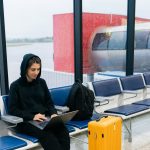Table of Contents
In a world that glorifies hustle culture and long work hours, the idea that working less could actually make you more successful might sound absurd. This counterintuitive approach could be the key to thriving both personally and professionally.
The digital nomad lifestyle is often depicted as the ultimate work-life balance—working from exotic locations, with plenty of time to explore and enjoy life. However, the reality for many is far from this ideal. The pressure to be constantly productive, to work long hours to sustain the lifestyle, and to keep up with the demands of clients or employers can lead to burnout and a diminished quality of life. But what if the secret to true success as a digital nomad wasn’t working harder, but working less? This counterintuitive approach might be the key to achieving not only greater professional success but also a more fulfilling, balanced life.

The Myth of the 24/7 Hustle
First, let’s address the elephant in the room: the belief that longer hours lead to greater productivity. The hustle culture is pervasive, especially among entrepreneurs, freelancers, and digital nomads. The belief that success requires working around the clock is deeply ingrained in many people’s minds.
The Reality Check:
- Diminishing Returns: Research shows that after a certain number of hours, productivity declines sharply. Long work hours can lead to mistakes, decreased creativity, and poor decision-making. Instead of gaining more, you might actually be achieving less.
- Burnout: Working excessively without adequate rest can lead to burnout, a state of physical and emotional exhaustion that severely impacts your ability to work effectively. Burnout can also affect your mental health, leading to stress, anxiety, and depression.
The Case for Working Less
1. Enhanced Creativity
Working less allows your mind to wander and make new connections, fostering creativity. When you’re constantly working, your mind is focused on immediate tasks and problem-solving, leaving little room for creative thinking. However, when you reduce your work hours, you give your brain the space it needs to explore new ideas, connect seemingly unrelated concepts, and develop innovative solutions. Creativity is often fueled by exposure to new experiences, and environments—something that’s hard to tap into when you’re glued to your laptop all day.
Hack: Implement a strict “no work after 3 PM” rule. This frees up your afternoons for exploration, reflection and encourages your mind to process the day’s experiences. Use this time to wander around your current location, immerse yourself in the local culture, or simply relax and let your thoughts flow freely.
2. Improved Decision Making
A rested mind makes better choices, both in work and travel. Decision-making is a critical part of both professional success and navigating the digital nomad lifestyle. When you’re overworked and stressed, your ability to make rational, long-term decisions diminishes. Resting your mind, however, leads to clearer thinking, better problem-solving, and more rational choices.
Hack: Practice the “10/10/10” rule: When faced with a decision, ask yourself, “Will this matter in 10 days, 10 months, or 10 years?” This framework helps you prioritize long-term benefits over short-term gains.
3. Better Work-Life Integration
More free time allows for deeper cultural immersion and a more balanced lifestyle. One of the greatest benefits of the digital nomad lifestyle is the opportunity to experience new cultures and environments. However, if your work consumes most of your time, you miss out on these enriching experiences. When you work less, you create more time for cultural immersion, personal exploration, and leisure activities. Balanced nomads tend to stay nomadic longer, building sustainable careers that are enriched by the diverse experiences they encounter along the way.
Hack: Create a daily schedule that prioritizes work-life integration. For example, work in the mornings and spend your afternoons and evenings exploring your surroundings, engaging in local customs, or simply enjoying the leisure activities that drew you to your current location in the first place.
4. Increased Focus and Efficiency
Limited work hours encourage prioritization of important tasks. When you have fewer hours to work, you’re forced to prioritize tasks that are truly important, leading to increased focus and efficiency. This concept is backed by Parkinson’s Law, which states that “work expands to fill the time available for its completion.” By limiting your work hours, you naturally become more productive, as you’re focused on completing high-impact tasks rather than getting bogged down in busywork.
Hack: Use the Pomodoro Technique, a time management method that involves working for 25 minutes followed by a 5-minute break. However, to maintain high focus during work hours, extend the breaks to 10-15 minutes. This approach encourages intense bursts of productivity while preventing mental fatigue.

5. Expanded Networking Opportunities
More free time allows for attending local events and meetups, expanding your network. Networking is essential for digital nomads, whether it’s for finding new clients, learning about local opportunities, or building relationships with other nomads. Working less gives you more time to engage with the local community, attend events, and build a strong network that can lead to better opportunities and collaborations.
Hack: Aim to attend at least one local event or meetup per week in your current location. Meeting new and fellow professionals lead to valuable connections and open doors to new opportunities.
6. Improved Health and Well-being
Reduced stress levels lead to better physical and mental health. The demands of the digital nomad lifestyle can take a toll on your health, especially if you’re working long hours. Working less reduces stress, which in turn leads to better physical and mental health. With more time available, you can focus on exercise, meditation, and other self-care practices that are essential for maintaining a balanced and healthy lifestyle. A healthy nomad is a more productive and happier nomad.
Hack: Incorporate a daily 30-minute workout or meditation session during what would normally be work hours. This small investment in your health pays off in the long run, as it boosts your energy levels, improves your focus, and enhances your overall well-being.
7. Enhanced Skills Development
Freed-up time can be used for learning new skills relevant to your nomadic career. Working less doesn’t mean you stop learning or growing—quite the opposite. The time you free up can be invested in developing new skills that are relevant to your career as a digital nomad. Learn a new language, master a new software, or hone your photography skills for your personal development. These make you more marketable and adaptable in an ever-changing world.
Hack: Dedicate 5 hours per week to learning a new skill or language relevant to your current location or career goals. This could be anything from taking an online course to practicing a new language with locals. This keeps your mind sharp.
The Power of Rest and Recovery
Rest and recovery are often seen as the antithesis of productivity, but they are actually essential components of sustainable success. For digital nomads, who must balance work with the demands of constant travel and adapting to new environments, rest is even more crucial. Prioritizing rest and recovery aids improved mental clarity, creativity, and overall health.
The Science Behind It:
- Brain Function and Creativity: Studies have shown that rest and downtime are crucial for brain function, particularly for creative thinking and problem-solving. When you’re well-rested, you’re more likely to come up with innovative ideas and solutions to challenges.
- Cognitive Recovery: Your brain needs regular breaks to recover and function optimally. Without sufficient rest, your cognitive abilities decline, leading to mistakes, poor decision-making, and reduced creativity.
- Physical Health: Regular rest helps maintain physical health, reducing the risk of burnout, illness, and other stress-related conditions. This is particularly important for digital nomads, who often deal with the physical demands of travel and adjusting to different time zones.
The Concept of “Essentialism” in Work
Essentialism is the disciplined pursuit of less but better. It’s about focusing on what truly matters and eliminating everything else. For digital nomads, who often juggle multiple responsibilities and distractions, essentialism can be a game-changer. This focus on high-impact tasks and minimizing distractions leads to greater efficiency and more time to enjoy the benefits of the nomadic lifestyle. The 4-hour workday concept borrows several elements from this.
How It Works:
- Focus on High-Impact Tasks: Instead of trying to do everything, focus on the tasks that will have the most significant impact on your goals. This might mean saying no to certain projects or delegating tasks that don’t require your unique skills.
- Eliminate Distractions: Digital nomads are often surrounded by distractions, from social media to the lure of exploring new places. By eliminating or minimizing these distractions, you can focus more effectively on what truly matters.
- Rest and Recharge: Use the rest of the day for rest, exploration, and personal development. This time away from work is essential for maintaining creativity, energy, and motivation.

Conclusion: Redefining Success as a Digital Nomad
In a world that often equates success with long hours and constant hustle, the idea of working less is revolutionary. Working less doesn’t mean being less successful. In fact, it can be the key to long-term success and fulfillment as a digital nomad. Remember, the goal of the nomadic lifestyle isn’t just to work from anywhere – it’s to live fully wherever you are.

I’m Ethan, a 42-year-old digital marketer and dad of two, living in Dublin. My passion is planning adventurous family vacations that combine cultural immersion with outdoor activities. With my kids growing into their teenage years, I’m dedicated to creating experiences that they’ll remember for a lifetime. ExploreWorkTravel is my platform to share tips, stories, and insights to help other families make the most of their travel experiences.




